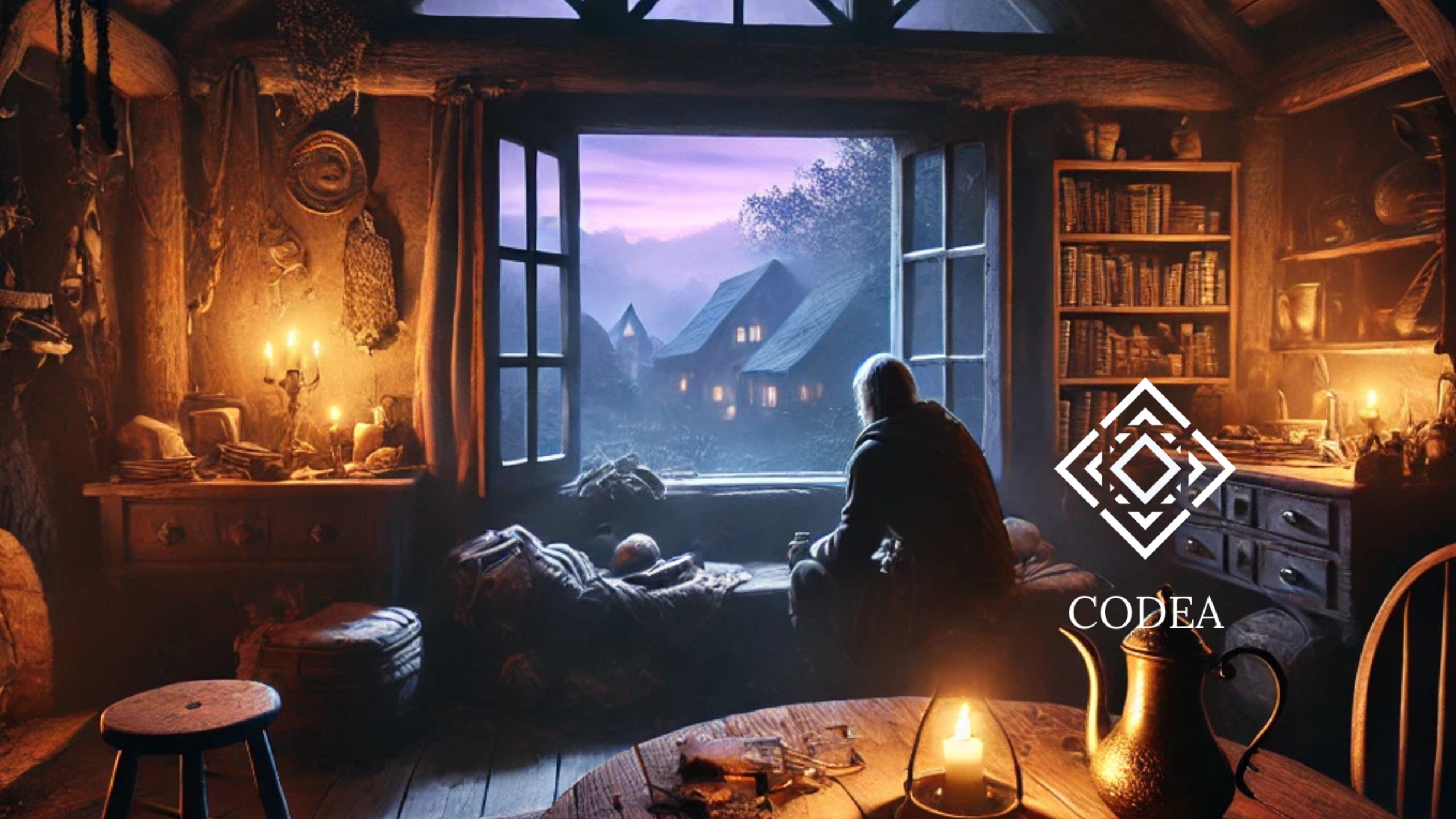Razko woke up the next morning, sunlight streaming weakly through the thin curtains of his room. His mind was already racing, a swirl of confusion and unresolved thoughts from the previous day. The voice—that voice—still echoed in his mind, sending a cold shiver down his spine. Who had that been? And more importantly, what did they want from him?
He tried to brush it off as he rolled out of bed, but the image of the shadowy figure standing on the edge of the firelight remained sharp in his memory. It didn’t make sense. Razko had heard about strange things happening to Auditors, rumors of mysterious forces at play, but he had never given them much thought. Now, though, he couldn’t help but wonder.
Just like he always did, Razko made a cup of coffee and stood by the window, staring out at the familiar view of Alatar, the quiet village that had been his home for as long as he could remember. The routine was comforting, grounding him in the present after the strange events of the night before. For a moment, he almost laced up his shoes, ready to head out the door, before the realization hit him.
There’s nowhere to go. He didn’t have a job anymore.
The weight of that thought pressed down on him. It wasn’t just the lack of income; it was the sudden shift in his identity. He had spent years working, moving through the same routine, day after day. And now, it was gone.
Instead of heading out, he sat down and opened his Personal Core, the image of the shadowy figure still lingering in the back of his mind. With a few taps, he began browsing through Codeium, searching for any images of Auditors—hoping to find something, anything, that would give him a clue about the person he had seen.
But there was nothing. No match, no trace of the figure, no explanation.
With a sigh, Razko set his Core down and shook his head. He couldn’t afford to let this mystery distract him. There was still so much to learn, and he couldn’t lose focus now. The strange encounter would have to wait. For now, it was time to get back to his studies. He opened his notes and resumed where he had left off.
1.3. Testing Principles
As he began to read, Razko felt his mind shift back into focus. This part of his training felt crucial, like the foundation for everything else he would learn as an Auditor. Seven principles of testing, each offering a guiding light for how to approach the task of ensuring that Codeium systems—magical systems—remained stable and reliable.
1. Testing shows the presence, not the absence of defects.
The first principle struck Razko immediately. No matter how thoroughly he tested a system, he could never prove that it was flawless. Testing could reveal defects, but it could never guarantee their absence. The goal was to reduce the likelihood of hidden flaws, not to claim perfection. Razko felt a small flicker of relief at this. The pressure wasn’t to make the magic perfect, but to make it reliable.
2. Exhaustive testing is impossible.
Razko smirked at this one. He had already suspected as much—testing every single part of a spell would be impossible, especially in complex systems where every component was intricately connected to the next. Instead, he learned, it was better to focus on the high-risk areas, the places where failures were most likely to occur. Prioritization was key.
3. Early testing saves time and money.
Razko nodded as he read. Catch problems early, and you wouldn’t have to deal with them snowballing into larger failures later. It made perfect sense. If defects were found early, they wouldn’t compound, leading to more and more problems down the line. The earlier a defect was caught, the easier—and cheaper—it was to fix.
4. Defects cluster together.
This principle intrigued Razko. The idea that most defects would be found in just a small portion of the system reminded him of the Pareto principle he had heard about—80% of the issues coming from 20% of the system. It was a pattern he would need to remember. When testing, he would need to focus on the areas most likely to fail, because once defects were found, more were likely hiding nearby.
5. Tests wear out.
Razko raised an eyebrow at this one. The idea that running the same tests over and over could make them ineffective hadn’t occurred to him. Testing wasn’t just about repeating the same steps—it was about evolving the tests, making them sharper and more capable of catching new defects. And yet, sometimes repeating tests was necessary—like when testing for regressions, to make sure old issues hadn’t reappeared.
6. Testing is context dependent.
This principle was clear—there was no single, universal way to approach testing. Each situation, each system, each project would require a different method. Context mattered, and understanding that context was key to successful testing. Razko could already see how this would play out in the world of Codeium—some spells were small and simple, others vast and complex, and the approach to testing would need to be adapted accordingly.
7. Absence-of-defects fallacy.
Razko felt a cold chill at this one. Even if a spell or magical system was thoroughly tested and all defects were fixed, it didn’t mean the system would succeed. A spell could be perfect and still fail to meet the needs of its users. Testing wasn’t just about ensuring that the magic worked—it was about making sure that it worked for the people who would rely on it. The success of a system wasn’t just in its technical perfection—it was in its usability, its ability to meet expectations and fulfill a purpose.

Razko let out a long breath as he finished reading. These seven principles were clear, but they were also profound. They would shape how he approached his future as an Auditor. Testing was not just about finding defects—it was about ensuring reliability, understanding risks, and thinking critically about how magical systems functioned in the real world.
As he closed his notes, Razko found his thoughts drifting back to the figure from the previous night. The shadowy presence, the cryptic words—“We’ve been watching you.”
He couldn’t shake the feeling that whoever it was, they had a part to play in his journey. And whether he liked it or not, he was going to find out.
Suddenly, there was a knock at the door.
Razko froze. He hadn’t been expecting anyone, and his pulse quickened at the thought of who it might be.
With slow, deliberate steps, he walked to the door and opened it.
Standing there, with a grin spread wide across his face, was Paelor—his best friend, rugged and charismatic as ever, dark hair falling haphazardly across his brow. But something was off about the way Paelor was looking at him, the gleam in his piercing blue eyes.
“Razko! You’re not going to believe what I’ve gotten myself into this time,” Paelor said, his voice brimming with excitement and mischief.
Razko stared at him, his mind racing. He had no idea what Paelor was about to say, but he was certain of one thing:
Whatever it was, it wasn’t good.
Paelor stood at the door with his usual grin, already brimming with excitement. It had been a while since they’d hung out properly, and as much as Razko had been consumed by his own worries, seeing Paelor brought a strange comfort—a reminder of simpler times.
“Come on, let’s go,” Paelor said, barely giving Razko time to respond before stepping inside, uninvited but welcome all the same.
Before Razko could even process it, Paelor launched into a grand new idea—something about a sawmill.
“It’s brilliant!” Paelor declared, his hands gesturing wildly as he paced around Razko’s small kitchen. “Think about it! Everyone needs wood, right? Houses, furniture—hell, even magic infrastructure! We can start small, set up the mill just outside the city, and then slowly expand. There’s demand, man! And with my connections, we’ll get in good with the local traders.”
Razko couldn’t help but smile, shaking his head at Paelor’s relentless enthusiasm. Paelor was always full of ideas, and this one seemed no different. But as Paelor kept talking, the enthusiasm faded slightly, and Razko caught a glimpse of the truth behind his friend’s energy.
“I got fired,” Paelor admitted suddenly, dropping his voice.
Razko’s heart sank a little. He had expected it—Paelor had always struggled to hold down a job. His impulsive nature, though charismatic, often clashed with the structured expectations of employers. They sat down, and soon enough, they were both talking about the frustrations of their lives—Razko without a job, Paelor cycling through ambitious plans without much follow-through.
It wasn’t long before Paelor pulled out a bottle of something strong and golden, pouring them both drinks. The conversation shifted, moving away from serious topics and toward old memories, as it always did when they drank together.
Soon, they were reminiscing about their younger days—the days when they used to make music together, carefree and untethered by responsibilities. Razko laughed, remembering how they used to stay up all night, strumming on makeshift guitars or banging on whatever they could find to create a beat. They had dreams of becoming musicians, of performing for crowds, of living without obstacles. It seemed so simple back then.
The music played from Razko’s Personal Core, soft and nostalgic, blending into the dim light of the kitchen. The autumn chill seeped through the window, but the warmth of the alcohol and the memories kept it at bay. September was always a little colder than expected, but nothing out of the ordinary.
“I miss those days, man,” Razko said, his words slightly slurred as the drinks began to take their toll. “When everything was… easier.”
Paelor nodded, his blue eyes distant for a moment. “Yeah, no responsibilities, no stupid jobs… just us and the music.”
For a few hours, they let themselves be taken back to that time—where the weight of the present didn’t exist. They drank, they laughed, they played music, and for a little while, the future didn’t matter. It was just them, like it always had been.
Eventually, though, the mood shifted. Razko, feeling the warmth of the alcohol fully settle in, finally mentioned the strange encounter he had in the field the night before. He told Paelor about the shadowy figure, the cryptic words, the unsettling feeling it had left behind.
Paelor, already deep into the bottle, listened with a mix of curiosity and drunken disbelief. “My dad used to tell me stories like that,” he said, his voice slightly slurred. “Ghosts… he swore he saw one back when he was my age. Said it haunted him for weeks.”
Razko shook his head. “This wasn’t a ghost. It felt… real. Too real.”
Paelor leaned back in his chair, the fire from his earlier excitement now replaced with the glaze of drunkenness. “Whatever it was, sounds like you’ve got some crazy stuff going on, man. Maybe you’re being watched. Maybe you’re special.”
The thought stuck with Razko, even as he tried to laugh it off. The fire in the pit of his stomach from the drinks was the only thing keeping him from sinking too far into that uncomfortable idea. He loved this feeling—being drunk, feeling relaxed, especially when times were hard. It let him forget the weight of the world, even if just for a while.
But deep down, Razko knew the moral hangover was coming. The kind that hits harder than any physical pain. Tomorrow, the anxiety would creep back, and the realities of his life would settle in once again. He would wake up regretting the drinks, the lack of progress, the sense of spinning his wheels.
And, just as he predicted, the next morning was a brutal one.
Razko woke up with a pounding headache and a gnawing sense of regret. The sunlight creeping through the window was too bright, and his mouth was dry as sand. He groaned, rolling over in bed, the events of the previous night swirling around in his head. The laughter, the music, Paelor’s voice… it all felt distant now, like a dream he couldn’t quite hold onto.
But the regret was real. He had drunk too much, gotten too lost in the temporary escape. And now, the reality of his situation hit him even harder than before. He didn’t have a job. He didn’t have a plan. All he had was the weight of knowing he’d wasted another day, and now, another morning.
He dragged himself out of bed, the familiar cold of September seeping into his bones as he stumbled into the kitchen. There would be no learning today—not like this. His mind was foggy, his motivation crushed by the hangover, both physical and emotional.
He sat at the kitchen table, head in his hands, for what felt like hours, the silence pressing down on him. Eventually, with nothing else to do and no desire to be productive, Razko ordered a pizza and spent the rest of the day playing video games, letting himself be distracted by the bright colors and fast-paced action on the screen.
It was a waste of a day, and he knew it. But sometimes, when the world felt too heavy, distractions were all you had.
The morning after his hangover, Razko felt the familiar weight of regret pressing down on him. His body was sluggish, his mind foggy, and even though the effects of the previous day’s drinking had mostly faded, the moral hangover remained. He sat at the kitchen table, staring at his cup of coffee, his thoughts heavy. There was no avoiding it—he wasn’t in his best form today. His brain felt like it was trudging through mud, making it hard to focus.
But something inside him wouldn’t let him sit idle again. He had wasted yesterday, and the reality of his situation gnawed at him. The weight of his lack of direction, his joblessness, and the lingering memory of the shadowy figure haunted him. He couldn’t let another day slip by. Not again.
Still, the thought of sitting down to read more from his course felt exhausting. His mind wasn’t ready to absorb text, not in this state. Then an idea struck him—listening. His Personal Core had the ability to play audio files, and there were sections of his course that could be delivered this way. He figured that perhaps, if he listened instead of reading, he could let the information sink in without forcing his tired mind to work too hard.
With a sigh, Razko picked up his Personal Core and searched for the audio version of the lesson. A soft hum filled the air as the Core responded, projecting a gentle glow before streaming the familiar voice of the automated narrator. He leaned back in his chair, closed his eyes, and let the words flow over him.
“Testing is context dependent, but at a high level, there are common sets of activities that form a typical test process. These activities can be tailored to suit the specific situation based on various factors.”
The voice was calm, steady, and somehow comforting. Razko let it guide him into the details of the test process, his mind slowly piecing together the information. As the voice continued, he could imagine the various stages of testing, like a well-organized system unfolding before him.
“1.4.1. Test Activities and Tasks. A test process usually consists of the following main groups of activities. Although these activities may follow a sequence, they are often implemented iteratively or in parallel…”
The voice explained that the testing process wasn’t always linear—sometimes things happened side by side, and flexibility was key. Razko pictured this flexibility like a spell being woven together in pieces, each thread tested and retested until the whole enchantment came together.
“Test planning involves defining the objectives of the test and selecting the approach that best fits the situation. It’s about knowing what you’re aiming for and then figuring out the best path to get there.”
Razko’s mind wandered slightly, imagining what it must be like to be part of a real project, sitting down with other Auditors and Developers, figuring out how to break down a massive spell into testable chunks. It felt strategic, almost like a battle plan being laid out before an important mission.
“Test monitoring and control come next, ensuring that everything stays on track, that progress is measured against the plan. If something goes wrong, control actions are taken to steer the process back on course.”
The steady voice painted a picture of ongoing oversight, the kind that made sure spells didn’t fall apart before they were ready. It reminded Razko that testing wasn’t a one-off activity—it was constant, a watchful eye ensuring that everything was moving toward success.
“Test analysis involves analyzing the test basis to identify the features and conditions that need to be tested. It answers the question: What are we testing? This is followed by test design, where test conditions are elaborated into actual test cases, answering the question: How are we testing it?”
Razko found himself nodding along. This was starting to make more sense. Test analysis was the step where you figured out what to focus on—like deciding which parts of a spell might be unstable or prone to error. Test design, then, was where you figured out how to test those parts, like crafting specific spells to poke and prod at the weaknesses.
“Test implementation follows. This is where you create the testware—your test data, your manual and automated test scripts. This is the stage where you’re building the tools you’ll use to run the tests.”
The mention of testware and scripts piqued Razko’s interest. It wasn’t just about the tests themselves, it was about building the environment in which the tests would run—crafting the tools to ensure success.
“Test execution is the stage where the tests are run, comparing actual results to the expected results. This is where the magic happens—literally and figuratively. Anomalies are logged and analyzed, and any defects are reported back to the team.”
He smiled at the phrasing—where the magic happens. It was true. In this world of Codea, testing was just as much a part of the magical process as spell creation itself. Without the tests, without pushing the spells to their limits, how could anyone know if they were truly safe?
“Finally, there are the test completion activities. At project milestones or after a testing phase, the testware is archived, the test environment is shut down, and any lessons learned are noted for future improvements.”
The process seemed so structured, so methodical. And yet, listening to it all laid out like this, Razko could see how it fit into the larger picture. Each phase of testing, from planning to execution to completion, was a critical step in ensuring that a system—whether magical or technological—worked as it should.
The voice continued, flowing into the context of testing and how it’s influenced by various factors—stakeholders, team members, the specific business needs, and the technical constraints of the system being tested. Razko let the details wash over him, finding comfort in the methodical way the information was being delivered.
He liked this method of learning, at least for now. It wasn’t overwhelming. He could focus on the ideas, let his mind wander, and still feel like he was absorbing the critical points.
As the voice in his Personal Core continued, Razko felt his focus returning, little by little. Maybe this wasn’t his best day, but at least he wasn’t wasting it. He was still moving forward, still learning, still working toward something greater.
Razko made a short break, heading into the small kitchen for a simple lunch. He threw together some sandwiches, his usual go-to when he didn’t feel like cooking anything complicated. Razko had always loved anything made from dough—bread, pizza, donuts—it didn’t matter. It was his small comfort, a reliable source of satisfaction no matter how the day was going.
He sat down, chewing absentmindedly as his thoughts wandered. The earlier part of the lesson played back in his mind, and he could feel the fog from the previous day lifting a little. This new method of learning—listening instead of reading—was helping. His mind wasn’t quite as sharp as he wanted it to be, but it was enough to keep moving forward.
After a few sandwiches, he stood up, wiped his hands, and felt the familiar tug of responsibility. There was more to learn. He couldn’t let himself slip into another wasted day. The sandwiches had helped, the break had been nice, but now it was time to finish the section.
Razko picked up his Personal Core and tapped it once again, restarting the audio where he had left off. The familiar voice filled the air once more.





Leave a Reply